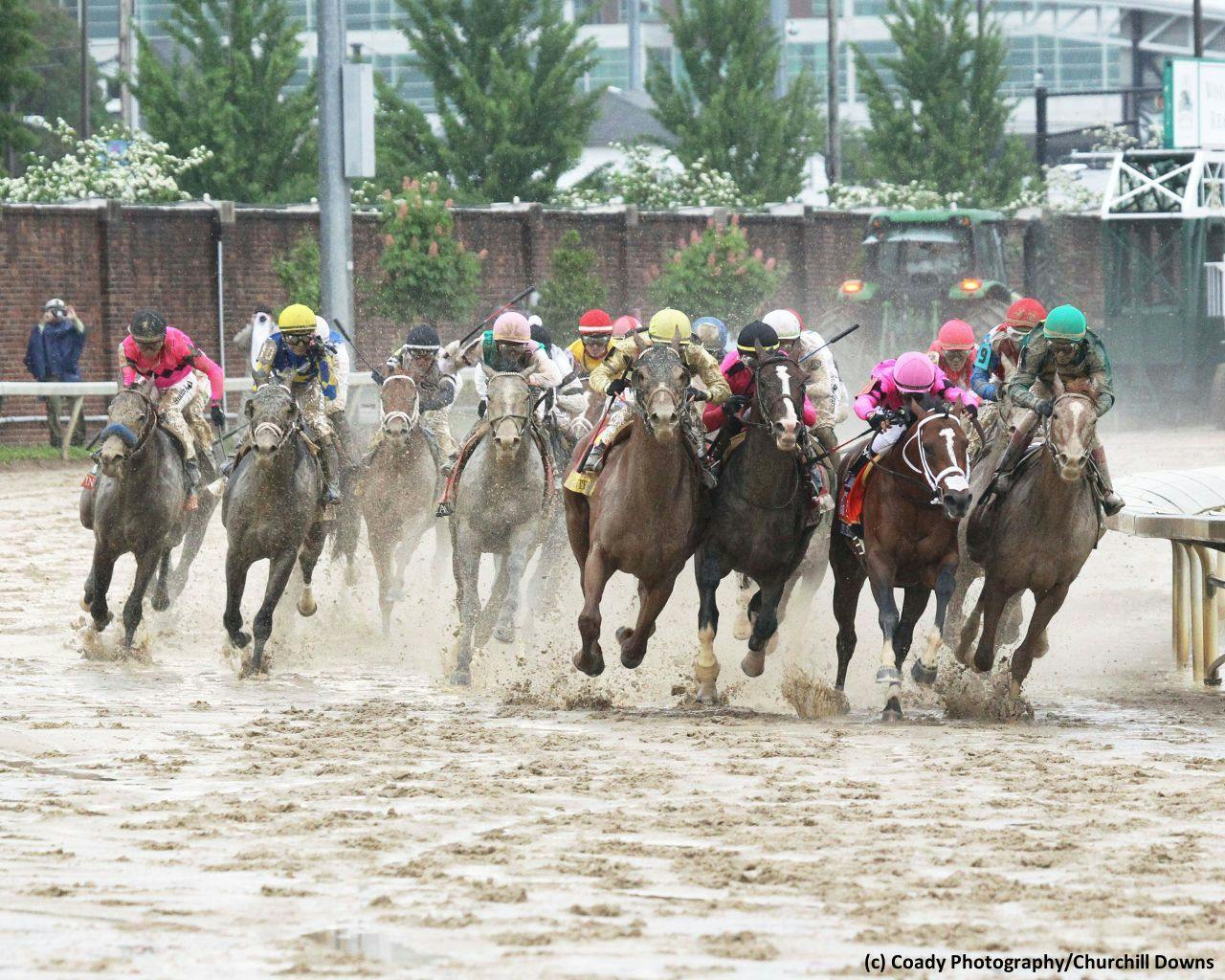Circumstances of Derby DQ less satisfactory than decision itself

Maximum Security (pink hat) shies off the rail into the path of War of Will (black hat), resulting in his disqualification as the 145th Kentucky Derby (G1) victor and elevation of Country House (light yellow hat) to winner (c) Coady Photography/Churchill Downs
I doubt anyone in racing likes the fact that disqualifications are sometimes necessary. Ideally, every race would be cleanly run and the better horse would win every time.
However, we're dealing with thousand-pound animals that vary in intelligence, ability, maturity, and, during the actual running of races, various states of physical and mental fatigue. There is also, of course, a human element directly involved in these athletic competitions as well, namely jockeys.
Until Saturday, no horse had ever been disqualified from first place in the Kentucky Derby (G1) due to actions that occurred during the actual running of the 1 1/4-mile event. That was a streak of 144 years, and is one reason why reaction to the events of Saturday night have been difficult for some to process. None of us expect, much less desire, the outcome of racing's signature event to be doubted once the field crosses the finish line.
As in all aspects of life, there's always a first time. And that first time has triggered plenty of emotion, and much to chew on going forward.
I don't have many qualms with the ruling per se. There was no valid reason for Maximum Security to have drifted outward several paths on the turn and interfere with War of Will, who was not a "beaten" horse at the time of contact, thus causing a chain reaction. I'm not so sure the same observation can be made regarding Long Range Toddy, behind whom Maximum Security was ultimately placed in the official order of finish.
Far more disconcerting was the path from Point A, the race, to Point B, the decision to disqualify the first-place finisher.
The stationing of patrol judges at various points around the racetrack, as occurred in the old days, has been made largely redundant due to improvements in video camera technology and footage. However, one could argue their absence was sorely missed when no public announcement was made that the stewards were instigating an immediate review of the incident.
That was a puzzling oversight in the eyes of this observer, who was stationed in the grandstand at the eighth pole and clearly witnessed suspicious activity both in real time and while glancing at Churchill Downs' Big Board, which provided viewers an overhead view of the action from a camera positioned ahead of the approaching field. The decision to apparently review the action only after two claims of foul were lodged was reminiscent of the situation I witnessed attending the 2016 Delaware H. (G1). In neither case can the lack of proactivity be considered satisfactory.
This is the video they should have been showing last night. Maximum Security clearly veers out 5 paths and totally impedes War of Will and Long Range Toddy. Watch it multiple times. Every time your conviction that the right call was made will increase. pic.twitter.com/0kYakwvjin
— Scott Carson (@CarsoniSoK) May 5, 2019
There was also much to be unsatisfied about in regards to who and who didn't lodge a foul claim. The connections of War of Will, the horse most immediately impacted by Maximum Security's errant ways, said Sunday that they chose not to lodge an objection as there would have been no material benefit awaiting them if Maximum Security had been disqualified. At best War of Will would have been placed seventh, which he was, but only the top five finishers earn purse money.
The claim of foul that the public was most aware of was that lodged by jockey Flavien Prat, the rider of Country House. In light of the stewards' post-race statement, and the footage readily available, Prat's objection was arguably frivolous. It was certainly one officials can take steps to dissuade others from repeating in the future.
Given what happened in the final quarter-mile between Maximum Security and Country House, I feel confident in thinking the record books will not acknowledge that the better of the two won the Kentucky Derby. That's the thing that perhaps disturbs most those who disagreed with the decision to disqualify.
While feeling the disqualification was warranted, the "winner" was not the best horse. The outcome of a Kentucky Derby, or any big race for that matter, is most dissatisfying when your head and heart tell you the result does not accurately reflect the merits of the individuals involved.
One of my first thoughts after the disqualification was announced was a conversation I had just last month with retired Hall of Fame jockey Bill Boland, who rode Middleground to victory in the 1950 Kentucky Derby. When recalling his narrow loss aboard Sword Dancer in the 1959 Derby, and his claim of foul against Tomy Lee that was dismissed, he said:
"The first year I rode in the Derby, they called all the jocks in and they told us, 'You know, we aren't going to take a horse down in the Derby. It's never been done. But if anybody causes any trouble, we'll give you up to a year.' So they weren't going to take a horse down in the Derby unless it was really bad. I think they would now, but in those days they wouldn't."
How timely. I would never have guessed that statement could possibly define what was about to happen.
PHOTO: Maximum Security (pink hat) shies off the rail into the path of War of Will (black hat), resulting in his disqualification as the 145th Kentucky Derby (G1) victor and elevation of Country House (light yellow hat) to winner (c) Coady Photography/Churchill Downs
ADVERTISEMENT



